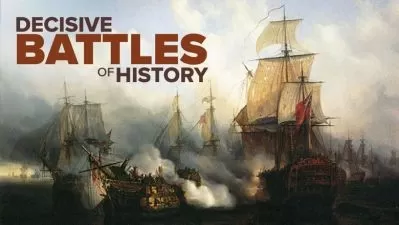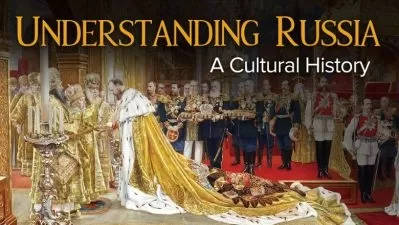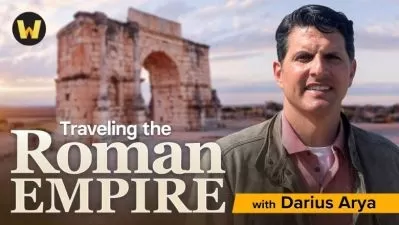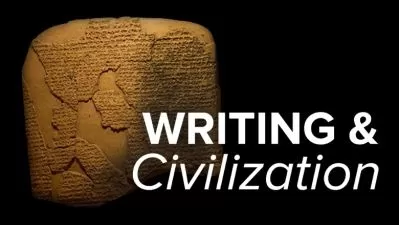Renaissance: The Transformation of the West
Jennifer McNabb
26:36:48
Description
There's the Renaissance we all know about: the cultural flourishing that produced iconic works of art, sculpture, and architecture. But underneath all the paint and marble is another side of the Renaissance with which we're much less familiar.
Born from the devastation of the Black Death, the European Renaissance is undoubtedly one of the greatest periods of civilizational achievement in human history. Transformations that began with the economic explosion of the Italian city-states in the 14th century and lasted through the dawn of the early modern world in the 17th century are ones we still feel today.
While it's easy to get caught up—and, rightfully so—in the art and architecture of the Renaissance, you cannot have a deep and genuine understanding of just how important these centuries were without digging beneath the surface, without investigating the period in terms of its politics, its spirituality, its philosophies, its economics, and its societies. It is just as vital to appreciate events and developments—such as the transition from feudal kingdoms to nation-states, the flourishing of international trade and exploration, epic wars and rebellions, revolutions of faith, and the rise (and fall) of different social status groups—as it is to understand the value of Michelangelo's Sistine Chapel ceiling or Leonardo's Mona Lisa.
Only by considering the European Renaissance from all sides, by disturbing traditional understandings, tipping sacred cows, and busting prevalent myths, can you truly grasp just how the Renaissance revolutionized the Western world.
In the epic 48-lecture course, Renaissance: The Transformation of the West, historian and award-winning professor Jennifer McNabb of Western Illinois University delivers a holistic, comprehensive view of the Renaissance that will show just how impressive and truly influential it was. Guiding you through centuries of exhilarating change in Europe with the knowledge, insights, and discernment of a master scholar, she offers new perspectives on familiar figures and events while focusing on often-unexplored or overlooked areas, such as the role of women in the Renaissance, the daily lives of the rural poor and urban elite, Renaissance home and family life, and the powerful connections between the Renaissance and the Reformation. Here, in one course, is an authoritative, wide-ranging, and multidisciplinary way to experience not just one of Europe's Renaissance movements—but all of them.
A Truly Transformative Period
“The scope of our course is broad,” says Professor McNabb, “because I want us to see the Renaissance not as a single event but as a transformative process whose influences touched many areas of early modern life.”
Renaissance: The Transformation of the West is organized into several sections that make the expansiveness of this historical period all the more manageable.
- Italian Renaissance: Examine how the Renaissance got its start in city-states, including Florence and Rome; how men like Machiavelli epitomized the “Renaissance Man;” and how the Medici and Renaissance popes maintained power.
- Northern Renaissance: Go beyond Italy for an extended look at how the Renaissance played out in places like England and the Netherlands. Along the way, you'll follow the lives and careers of people like Jan van Eyck, François Rabelais, and Thomas More.
- Renaissance Life: What were Renaissance attitudes about shame and honor? Why were letters so important to so many Renaissance writers? How did women exert power? How did different societies construct their ideas about marriage?
- Renaissance Faith: Central to these centuries were competing beliefs about the role of faith in political and daily life. Professor McNabb guides you through the Reformation, religious positions of theologians like Luther and Calvin, the Council of Trent, and more.
- Renaissance Politics: Perhaps, the single most important transformation in Renaissance Europe occurred not in the humanities but in politics and economics. You'll explore the roots of modern diplomacy, capitalism, warfare, and global rivalries.
New Stories, Insights, and Revelations By observing the Renaissance less casually and more critically, Professor McNabb offers a wealth of facts, details, insights, and connections you can't find in typical narratives that celebrate the centuries between medievalism and modernity.
Here are just a few of many exciting, intriguing, and illuminating things you'll uncover in Renaissance: The Transformation of the West.
- Renaissance palace schools believed in close, interpersonal relationships between teacher and student—a marked contrast to dispassionate medieval classrooms, where corporal punishment was liberally employed.
- While no new concept of femininity emerged during the Renaissance, noble women were able to contribute to the culture of the period, beyond their own productions, through the process of patronage.
- One of the most important musical innovations by the famed Renaissance composer, Guillaume Dufay, involved replacing medieval chants traditionally used for Mass with more dynamic and complex secular tunes.
- A popular feast day celebrating St. John the Baptist (dated June 24) was grafted onto older, pre-Christian traditions celebrating the summer solstice and fertility—which is why it's often referred to as Midsummer.
- During the later centuries of the Renaissance, secular authorities as well as spiritual ones got involved in the witch-hunting business; rulers seeking to centralize state power saw witches as dangerous obstacles to their political goals.
- The pastry casings we associate with Renaissance meals were simply a cooking vessel that contained the filling—as the crust buffered the pies' valuable insides—and were often discarded at Renaissance tables, uneaten.
The Greatest Stories Ever Told
Professor McNabb's extensive background in medieval and Renaissance history makes her the perfect guide through these exciting, tumultuous, and powerful centuries of Western civilization.
She brings to every lecture of Renaissance: The Transformation of the West the same celebrated teaching style that has earned her awards, including the Provost's Award for Excellence in Teaching from Western Illinois University. She's also taken care to include maps, illustrations, portraits, paintings, literary excerpts, and other elements to help you organize the epic scope of this subject.
“I think we're still living the Renaissance,” Professor McNabb says. “We're Renaissance people. We've updated some aspects of the Renaissance past and infused it with our own contemporary concerns. And, such activities are in keeping with the Renaissance as well.”
Prepare for a deep dive into Europe's great Renaissance movements, which Professor McNabb considers the greatest stories ever told—and ones well worth listening to, still.
More details
User Reviews
Rating
Jennifer McNabb
Instructor's CoursesDr. Jennifer McNabb is a professor of history and the chair of the Department of History at Western Illinois University. She received her PhD in History from the University of Colorado Boulder in 2003. Since joining Western Illinois University in 2005, Professor McNabb has received the Provost’s Award for Excellence in Teaching and the College of Arts and Sciences Outstanding Faculty Award for Teaching and for Service. She also served as the associate director of the University of Illinois Centennial Honors College.
Professor McNabb has spoken and published widely on social relationships in early modern Europe, especially courtship and marriage. In addition to articles in journals such as the Journal of Women’s History and Quidditas, she has authored material for several textbooks on Western civilization and European history. Professor McNabb has served as president of the Rocky Mountain Medieval and Renaissance Association and is the former chair of the program committee of the Midwest Conference on British Studies. In 2018, she was appointed as the Advanced Placement European History Chief Reader.

The Great Courses
View courses The Great Courses- language english
- Training sessions 48
- duration 26:36:48
- English subtitles has
- Release Date 2023/06/06
















